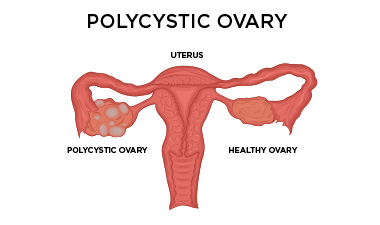The normal menstrual cycle relies on a properly balanced, complex system of hormones. Disorders that alter your hormones can result in HMB.
What causes immaturity of the hypothalamic-pituitary-ovarian axis?
Immaturity of the hypothalamic-pituitary-ovarian axis
What is immaturity of the hypothalamic-pituitary-ovarian axis?
In the 2-3 years that follow the first period, many adolescent girls experience irregular periods. Sometimes this comes in the form of missed or very light periods, while others may experience heavy menstrual bleeding (HMB). The menstrual cycle is controlled by complex interactions between the hypothalamus, the pituitary gland, and the ovaries (called the hypothalamic-pituitary-ovarian axis). This system takes time to mature, and when it is not functioning properly, ovulation may not occur. When ovulation does not happen, there is no progesterone present in the uterus, and the lining of the uterus becomes very thick and contain more blood vessels than usual. This can result in a heavy and prolonged period. This is one of the most common cause of HMB in adolescents.
What causes immaturity of the hypothalamic-pituitary-ovarian axis?
It is not known why the hormonal regulation of the menstrual period is sometimes slower to develop.
What are the symptoms of an immature hypothalamic-pituitary-ovarian axis?
You may have irregular periods or skip a period. Or, you may have HMB. The HMB associated with immaturity of the hypothalamic-pituitary-ovarian axis is not different from other causes of HMB. This means you have any of the following:
- Bleeding that lasts more than 7 days.
- Bleeding that soaks through one or more tampons or pads every hour for several hours in a row.
- Needing to wear more than one pad at a time to control menstrual flow.
- Needing to change pads or tampons during the night.
- Menstrual flow with blood clots that are as big as a quarter or larger.
How is immaturity of the hypothalamic-pituitary-ovarian axis diagnosed?
Immaturity of the hypothalamic-pituitary-ovarian axis is usually diagnosed when all other causes of HMB have been ruled out. Documenting the symptoms of your menstrual periods in a menstrual diary can be very helpful. Your doctor may recommend a number of blood tests to rule out other causes of HMB (e.g., bleeding disorders, thyroid problems).
How is immaturity of the hypothalamic-pituitary-ovarian axis treated?
If HMB is interfering with your day-to-day activities, you may be prescribed oral contraceptive pills (or other hormonal birth control) to help control the bleeding. A non-hormonal medication, tranexamic acid, may also be used during heavy menstruation. Iron supplementation will also likely be recommended.
Stress
What is stress?
Psychological or mental stress is defined as a state of mental strain resulting from adverse circumstances. Mental stress can cause changes in menstrual cycles, which can range from skipped or irregular periods , to heavy menstrual bleeding.
What are the symptoms of stress?
Stress manifests itself in many mental and physical ways, including:
- Pain
- Headache
- Fatigue
- Diarrhea, upset stomach
- Loss of sexual desire
- Dry mouth
- Grinding teeth
- Changes in appetite
- Tense muscles, muscle aches
- Insomnia
- Anxiety
- Depression
- Irritability and anger
- Avoiding others
- Difficulty relaxing
How is stress diagnosed?
If you are having these symptoms but are not sure whether it is stress that is causing them, see your doctor. He or she will determine whether other illnesses may be causing your symptoms.
How is stress treated?
There are many things you can do to help manage your stress levels. Talking to a trusted friend or family member about what you are going through can help. Carving out small blocks of time for activities that help you relax, such as exercise, yoga, painting, or reading can also help. If you are finding your stress very hard to manage, talking to a therapist with expertise in cognitive behavioural therapy can help you change some of your thinking patterns and learn to cope better. In some cases, medications may be useful to treat some of the symptoms caused by stress.
Polycystic ovary syndrome
What is Polycystic Ovary Syndrome?
 Polycystic Ovary Syndrome (PCOS) is a common disorder in women and girls of reproductive age. It affects between 5-10% of women of childbearing age. PCOS is caused by changes in reproductive hormones that cause problems in the ovaries. Ovulation may not occur, or may be infrequent. PCOS is one of the most common causes of female infertility. Women with PCOS have disturbances in a number of hormones related to the menstrual cycle and reproduction, and metabolic disturbances. This often includes higher than normal levels of “male” hormones, or higher insulin resistance.
Polycystic Ovary Syndrome (PCOS) is a common disorder in women and girls of reproductive age. It affects between 5-10% of women of childbearing age. PCOS is caused by changes in reproductive hormones that cause problems in the ovaries. Ovulation may not occur, or may be infrequent. PCOS is one of the most common causes of female infertility. Women with PCOS have disturbances in a number of hormones related to the menstrual cycle and reproduction, and metabolic disturbances. This often includes higher than normal levels of “male” hormones, or higher insulin resistance.
What is the cause of PCOS?
The cause of PCOS is not well understood, but likely has a genetic component. If your mother or sister has PCOS, you are more likely to develop the syndrome. Since there is a connection between diabetes and PCOS, if you have relatives with diabetes, you may also be more prone to PCOS. Excess body weight is also related to the development of PCOS.
What are the symptoms of PCOS?
While many women with PCOS have infrequent periods, others have frequent, heavy menstrual periods. Other symptoms that often accompany PCOS include:
- Heavy menstrual bleeding
- Irregular periods
- Hair growth on the face, chin, or other parts of the body.
- Acne on the face, chest, and upper back
- Thinning hair
- Weight gain
- Darkening of the skin in some areas of the body
- Skin tags in the armpits or neck
- Infertility
Women with PCOS are also at risk of having other health problems, including diabetes, high blood pressure, high cholesterol, and sleep apnea.
How is PCOS diagnosed?
Diagnosing PCOS involves a combination of physical examination (e.g., blood pressure, weight, hair growth patterns, skin problems etc.), pelvic ultrasound, and blood tests to measure your hormone levels. Having the details of your periods written down in a menstrual diary can help your doctor identify if you have PCOS.
How is PCOS treated?
Losing weight can help improve your hormone levels, and reduce your symptoms. Even a loss of 10% of your body weight can improve your menstrual cycles, and make it more likely that you will ovulate. Because of the metabolic changes in PCOS, a low carbohydrate diet, such as that used for diabetes, combined with regular exercise and physical activity will be most effective at weight control. While PCOS cannot be cured, there are treatments that can help manage the individual symptoms.
| Symptom | Treatment |
| Menstrual irregularities | Birth control pills |
| Insulin insensitivity | Insulin-sensitizing medications |
| Infertility | Ovulation induction medications |
| Male-pattern hair growth | Topical or oral anti-hair-growth medications |
| Acne | Acne treating medications |
| Anemia | Iron supplements |
Hypothyroidism
What is hypothyroidism?
Your thyroid gland is found in your neck, and is responsible for secreting hormones that have many effects on your body, including control of energy metabolism, growth rate in children, heart and lung function, sexual function, and sleep. Heavy menstrual bleeding can arise when the thyroid produces low levels of thyroid hormones, called hypothyroidism.
What causes hypothyroidism?
The most common cause of hypothyroidism in Canada and other countries where salt is iodized, is an autoimmune disease called Hashimoto’s thyroiditis. This is a condition where the immune system makes antibodies that attack the thyroid gland. Other causes included congenital abnormalities, diseases causing inflammation of the thyroid gland, medications (e.g., amiodarone, lithium), and removal of the thyroid gland. Although it is very uncommon in Canada, hypothyroidism can be caused by iodine deficiency.
What are the symptoms of hypothyroidism?
Symptoms that accompany hypothyroidism include weight gain, fatigue, hair loss, not being able to tolerate cold temperatures, constipation, depression, and slow heart rate. Dry skin and brittle nails are also common. Women with Hashimoto’s thyroiditis may have difficulty conceiving.
How is hypothyroidism diagnosed?
Blood tests for thyroid hormones (TSH, T4) and anti-thyroid antibodies can confirm suspected thyroid problems.
How is hypothyroidism treated?
Treatment of hypothyroidism depends on the cause of the problem. Most people with hypothyroidism will be treated by replacing thyroid hormones with a synthetic form of the thyroid hormone called thyroxine. Iron supplementation will also likely be recommended if you have experienced prolonged heavy menstrual bleeding.

